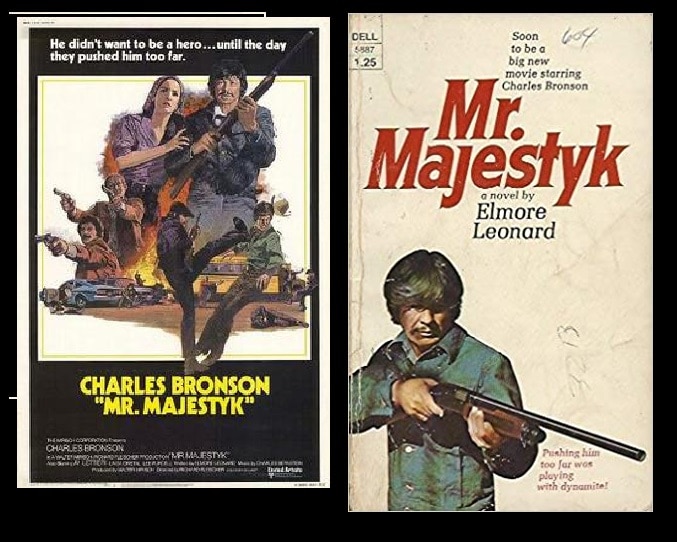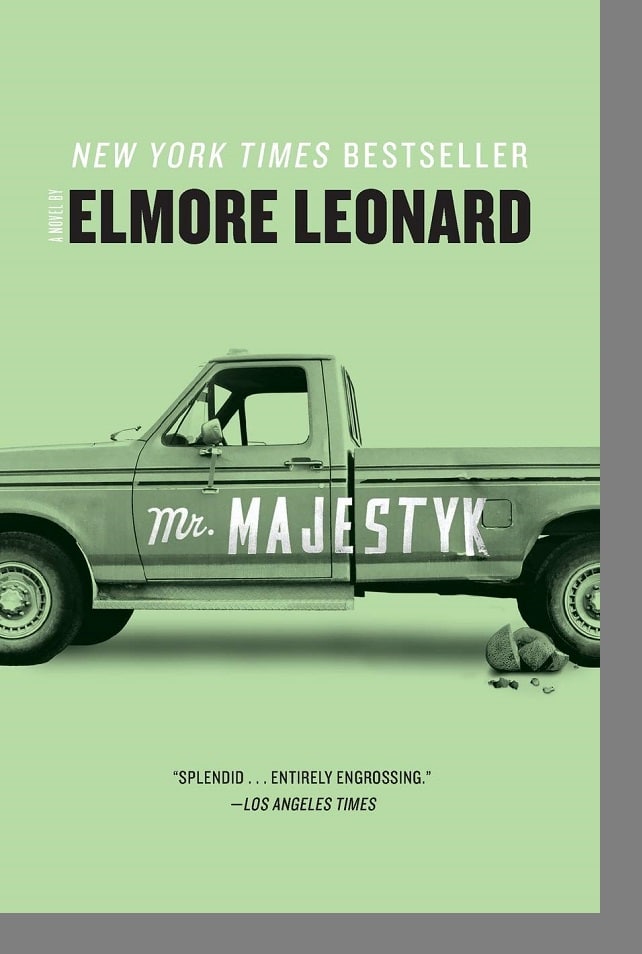As far as I can tell, Mr. Majestyk is the only one of Elmore Leonard’s many novels that was originally a movie.
It started life as a Leonard screenplay that was made into the 1974 film Mr. Majestyk, starring granite-faced Charles Bronson. Leonard wrote the novelization, published in the same month as the release of the film and featuring Bronson on the cover.

I found this out about midway through my reading of Mr. Majestyk when I was wondering why this particular Leonard novel was so short (138 pages) and thinner than usual in the tangential plot elements that give a Leonard novel its pizzazz.
Even so, this is a full Leonard novel inasmuch as it pits a tough, stubborn, flawed loner, Vincent Majestyk, who’s minding his own business, against an intrusive bad guy, in this case, Frank Renda, a mob hitman who’s taken umbrage at the melon grower.
And, although fewer, there are certainly those tangential sentences and paragraphs that make reading Leonard so delightful.
“Get a melon crop in”
Leonard’s heroes are men with a code, and Majestyk’s code involves his attempts to grow and market melons, regardless of what else is going on, such as Renda trying to kill him. At one point, he has Renda in handcuffs to take to the police, and the hit-man is trying to trade for his freedom:
“Tomorrow night, we could be in L.A. Stay at a place I know, get some broads in, booze, anything you want to eat or drink, get some new clothes…”
“I been to L.A. I been to Mexico and I been laid.”
“Okay, what do you want?”
“I want to get a melon crop in. That’s what I want to do.”
“Bet your life against a melon crop”
This becomes a refrain through the rest of the novel. At one point, Majestyk is thinking about what Renda is doing to hunt him down.
No, whatever’s going to happen is going to happen, Majestyk thought. So go home and pick your melons.
Later, he’s talking to the cops who want to arrest Renda but need Majestyk’s help.
“Still worried about your melons. You’re not going to get them picked if you’re dead.”
“And if I’m dead it won’t matter, will it?”
“You want to bet your life against a melon crop— All right, you’re on your own.
“I have been from the beginning.”
“Each one a person now”
I haven’t seen the Bronson movie, but it’s easy enough to imagine that taciturn actor chopping off these sentences, like felling trees in a forest.
Still, it’s a measure of Leonard’s skill that, most of my reading time, I didn’t imagine Majestyk as Bronson but as the usual Elmore hero, an average-looking third baseman kind of guy, stronger and more agile and more skilled than he appears but far from superhuman, a guy who’s good but not squeaky clean, a guy who is an average Joe who accepts other average Joes.
Such as, in this case, the Hispanic laborers who pick melons for him and are now watching him confront a gas station attendant who doesn’t want them to use the toilets:
Watching him, the migrants were grinning, beginning to glance at each other, confident of this man for no reason they knew of but feeling it, enjoying it, stained and golden smiles softening dark faces and bringing life to their eyes, expressions that separated them as individuals able to think and feel, each one a person now, each one beginning to laugh to himself at this gas station man and his boss and his wastebasket and his toilets he could keep locked or shove up his ass for all they cared. God, it was good; it was going to be something to tell about.
“Flying along having a nice time”
Of course, it’s not just Leonard’s heroes who find humanity in the average Joes of the world. It’s Leonard the writer, as well.

As he does in many of this novels, Leonard enables even the bad guys to be persons, to come alive, by imagining them doing the sort of everyday things and thinking the everyday thoughts of you and me, such as Gene Lundy, Renda’s right-hand man who is ruminating while driving down a desert highway:
Lundy was counting the bug stains, more than a dozen of the yellow ones: some kind of bug flying along having a nice time and the next thing sucked into the wind, coming up fast over the hood and wiped out, the bug not knowing what in the name of Christ happened to him. Maybe they had been butterflies. Seeing the bugs suddenly, there wasn’t time to tell what they were…
Maybe they were all different kinds of bugs, but all bugs were yellow inside. Like all people were red inside. Maybe. Lundy had never thought about it before. His gaze held on the stained windshield as he waited for a bug to come up over the hood.
This sort of thing has nothing to do with the plot but appears often in Leonard novels. It’s what gives them their weight and savor.
Mr. Majestyk is a novelization, but it’s even more a full Elmore Leonard novel.
Patrick T. Reardon
12.17.20
Written by : Patrick T. Reardon
For more than three decades Patrick T. Reardon was an urban affairs writer, a feature writer, a columnist, and an editor for the Chicago Tribune. In 2000 he was one of a team of 50 staff members who won a Pulitzer Prize for explanatory reporting. Now a freelance writer and poet, he has contributed chapters to several books and is the author of Faith Stripped to Its Essence. His website is https://patricktreardon.com/.
